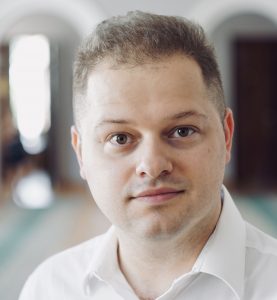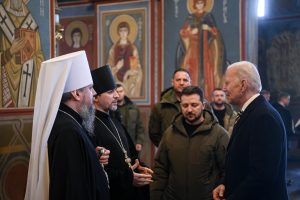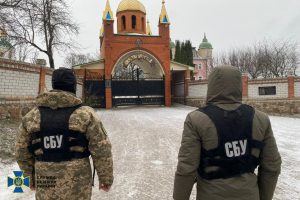Dmytro Vovk is a visiting associate professor at Benjamin N. Cardozo School of Law and Director of the Centre for the Rule of Law and Religion Studies, Yaroslav Mudryi National Law University (Ukraine). An earlier version of this piece was posted on Forum18.
is a visiting associate professor at Benjamin N. Cardozo School of Law and Director of the Centre for the Rule of Law and Religion Studies, Yaroslav Mudryi National Law University (Ukraine). An earlier version of this piece was posted on Forum18.
The Russia-Ukraine war, starting with the annexation of Crimea and the military conflict in eastern Ukraine and continuing with Russia’s full-scale invasion, has had a tremendous effect on freedom of religion or belief (FoRB) and other related human rights in the region. Murders, tortures, forced detention, and FoRB violations—including forced displacement of priests and believers, acts of religious discrimination and social hatred to religious minorities inspired and directed by Russian proxies, as well as expropriations of religious properties—have become the reality of the territories occupied by Russia in 2014 and 2022.
Since Russia’s renewed February 2022 full-scale invasion of Ukraine, Russia had through January 2023 also destroyed or damaged up to 500 religious properties belonging to Orthodox, Protestant, Catholic, Jewish, and Islamic religious communities. Maksym Vasin of the Institute of Religious Freedom estimates that around one-third of these belong to the Ukrainian Orthodox Church (UOC), which is historically and ecclesiastically linked to the Moscow Patriarchate.
Freedom of religion or belief FoRB-violations in the Ukrainian territories occupied by Russia since 2014 have not followed one pattern. While in Crimea the Russian government has planted the whole spectrum of religious restrictionspreviously implemented inside the Russian Federation, in eastern Ukraine these restrictions and repressions have been accompanied by acts of pure violence committed by the Russian military and paramilitary groups.
The War, the Ukrainian Orthodox Church, and the State
In the territories under the Ukrainian government’s control, the war has significantly transformed its relationship with the UOC. Under President Poroshenko, the Ukrainian government made a crucial contribution to the establishment of the UOC’s main rival in inter-Orthodox competition—the Orthodox Church of Ukraine (OCU)—and diplomatically supported its ecclesiastical recognition by the Ecumenical Patriarchate in 2019.
Later that year the Ukrainian parliament adopted two laws primarily affecting the UOC. The first one sets up a decision-making process for religious communities aiming to change their religious jurisdiction. The law requires that the decision of transition to a different jurisdiction be made solely by members of the religious organization. This aims to prevent a practice common to both the UOC and the OCU where any changes to Orthodox parish charters must be approved by the respective ruling bishops. Despite the fact that the law is formally generally applicable, its authors and supporters made little secret that their purpose was to support the OCU and their prime goal is to simplify and encourage the transition of UOC communities to the OCU.
The second law forces religious organizations and associations with “ruling centers” in Russia to change their names in order to explicitly identify their links with Moscow. The law also prohibits these organizations from sending their chaplains to the Ukrainian Army. The second law was brought before the Ukrainian Constitutional Court, and in December 2022 the court declared the law constitutional, which opened the door to forced renaming.
Shift in Zelensky’s Attitude Toward Religion and the UOC
During the first years of his presidency and even the first months of the Russian aggression, President Zelensky initially stepped back from religion politics and kept his distance from religion. In April 2022, members of Zelensky’s parliamentary faction insisted that the Parliament would not consider a proposed ban on the UOC until the war was over in order not to provoke divisions within Ukrainian society. Zelensky’s attitude evolved in fall of 2022, apparently under the pressure of several cases of UOC clerics collaborating with the Russian military (sometimes proven by courts) and growing support for sanctions against the Church in the Ukrainian public mind.

In October through December 2022, the Security Service of Ukraine (SBU) conducted several searches of UOC properties and the private residences of UOC clerics across the country and is reported to have found Russian propaganda materials, evidence of Russian citizenship obtained by several UOC clerics, as well as Russian army provision. Finally, in December 2022, based on the decision of the Council of National Security and Defence, Zelensky requested that the Cabinet of Ministers draft a law banning religious organizations affiliated with Moscow, while emphasizing that this law must comply with international FoRB standards and Ukraine’s obligations to the Council of Europe. The presidential decree also requires the State Service for Ethnic Policies and Freedom of Conscience (SEPFP) to conduct a “religious expert examination” of the UOC charter regarding its ecclesiastical link with the Moscow Patriarchate. In addition, the Cabinet of Ministers dismissed the SEPFP head, the more neutral Olena Bogdan, and appointed to the office Viktor Yelensky, who is an open supporter of the OCU and a long-term public critic of the UOC and its leadership.
The Government’s Draft Law
The Cabinet of Ministers (the Government) submitted its draft law to Parliament in mid-January 2023, and according to Mykyta Poturayev, head of the Parliamentary Committee on Humanitarian and Information policies, the law is expected to be adopted in March. It is not the first time that a draft along these lines has been submitted to the Ukrainian Parliament since the beginning of the full-scale war. Similar draft laws were submitted by oppositional MPs in March and November 2022. The March draft law imposed an automatic legislative ban on religious organizations affiliated with Russia. The November draft went even further and proposed, in addition to the full ban, prohibiting use of the word Orthodox by any organizations except the Orthodox Church of Ukraine, with an exception made for those organizations permitted by the OCU.
The government’s draft law takes a different approach. It prohibits the operation of religious organizations (associations) affiliated with “centers of influence of religious organizations or associations with ruling centers” in Russia but imposes on the state the obligation to prove the affiliation in court. In such cases the SEPFP is required to conduct a religious expert examination identifying the affiliation with Moscow, and then either SEPFP or a prosecutor must bring the case to a court, which will have power to make a final decision.
While more moderate, the government’s draft law still raises at least three concerns from a FoRB perspective.
First, the concept of “affiliation with centers of influence” in Russia is quite vague. If it means that the Russian Orthodox Church (ROC) or Russian government successfully uses the ROC’s ecclesiastical power to guide or compel UOC parishes, clergy, or believers to conduct illegal activities—for example, to call for violation of territorial integrity, to collaborate with the Russian army and secret services, or to publicly justify the Russian aggression—then a repressive response from the state is a legitimate result. In this case, however, the state does not need any special legislation; general criminal-law and public-law measure are effective enough to prosecute any individual and entity involved in such activities. At the same time, if affiliation presupposes merely historical, symbolic, or ecclesiastical subordination with no illegal activities conducted by communities, clerics, or believers, the affiliation preserved during Russia’s aggression can provoke public criticism but is not sufficiently necessary to impose legal bans on these communities.
This leads us to the second concern. International standards and good practices demand that states utilize the dissolution or deregistration of religious organizations as the last resort when less restrictive measures are not effective to address security concerns. This particularly means that deregistration would be an appropriate measure when illegal activities are conducted not by separate individuals or even top-level clerics but when the leadership or the majority of members are involved in these activities.
We know that the ROC and its leadership have actively supported and promoted Putin’s aggression against Ukraine. The SBU reported dozens of cases of UOC clerics’ involvement in the justification of the Russian aggression against Ukraine, incitement of religious hatred, and collaboration with Russian troops in occupied territories. In December 2022 UOC priest Andriy Pavlenko, sentenced by a Ukrainian court for spying for Russia, was traded to Russia in a prisoner exchange. In February 2023, another UOC cleric, Mykola Zirka, received a seven-year prison sentence for collaborating with the Russian occupying administration in the Donetsk region and then was also traded to Russia in a prisoner exchange. Given that the UOC officially consists of about 11,000 communities, and they are all separate legal entities connected with each other ecclesiastically but often not legally, the state would have to prove that the leadership or majority of parishioners of each parish are involved in illegal activities.

Finally, the concept of a religious expert examination is also vague and questionable. Across the post-Soviet region, especially in Russia and Central Asian countries, authorities and courts often use expert opinions prepared by biased or dependent experts to target and ban new or unpopular religions. Based on Zelensky’s decree of December 2022, the examination of links between the UOC and the ROC has already started, and the UOC has challenged the impartiality of several engaged experts, claiming they belong to the OCU and are biased toward the UOC. Ukrainian religious legislation provides no regulation regarding the scope and principles of this examination, nor requirements for experts, their education, background, or integrity. It’s an obligation of the state to demonstrate the impartiality and competence of the chosen expert panel.
How the Government is Going to Identify the “Affiliation”
The draft law doesn’t contain a definition of “affiliation with centers of influence.” However, the 1991 Ukrainian law on freedom of conscience and religious organizations already contains the definition of “affiliation with ruling centers” in Russia for purposes of regulating the name of religious organizations.
Article 12 of the law stipulates that religious organizations (associations) affiliated with a ruling center in Russia must identify this affiliation in their charter. To be recognized as affiliated with a Russian ruling center, the Ukrainian religious organization (association) must meet one of the following criteria:
- its charter contains a provision regarding its incorporation into the religious organization (association) with a ruling center in Russia;
- the charter of the Russian organization (association) contains a provision recognizing the Ukrainian organization (association) as a part of its structure, and the right of the Russian organization (association) to adopt binding decisions regarding the Ukrainian organization (association); or
- the charter of the Ukrainian organization (association) contains provisions regarding the mandatory participation of its leaders or representatives in ruling bodies of a Russian organization (association), with the right of vote.
In May 2022, the UOC tried to address this issue by declaring its full independence from the ROC and eliminating from its charter all provisions regarding its subordination to the ROC and its Patriarch as well as the participation of UOC representatives in ROC ruling bodies. Yet the UOC’s ecclesiastical status remains ambiguous, and the UOC still meets the second criterion of affiliation, as the ROC charter continues to recognize the UOC as the part of the Moscow Patriarchate. This effectively prevents the UOC from “unaffiliating” in the eyes of the Ukrainian state and in terms of Ukrainian law. To do this the UOC must have the ROC charter amended and all UOC–related provisions excluded by the Moscow Patriarchate, which is a highly unlikely or even impossible scenario. What is much more likely is that the ROC will keep insisting that the UOC remain an intrinsic part of its structure. Recently Russia initiated a UN Security Council meeting where a high-ranking ROC cleric in concert with the Russian representative promoted the narrative of the Ukrainian government’s attack against “the activities of churches with ties to the Russian Orthodox Church.” (The UOC publicly disassociated itself from these statements.)
Religious Expert Examination
On 1 February 2023, when this post had already been written, the group of experts appointed by the SEPFP published their opinion regarding the UOC’s affiliation with the ROC. Overall, the opinion follows the above-mentioned logic. The experts point out that the Moscow Patriarchate doesn’t recognize the UOC as fully independent and no evidence exists that then–UOC leader, Metropolitan Onufry left the ROC Synod. In addition, they emphasize that no other Orthodox churches recognize the UOC as an independent (autocephalous) church and the UOC didn’t make any steps toward this recognition. Thus, the experts conclude, the UOC remains a part of the ROC.
What’s Next?
Given Zelensky’s recent steps and statements, the draft law banning religious organizations affiliated with centers of influence with Russia will likely be adopted. There is no evidence that the Ukrainian government requested assistance from any international human rights or rule of law organizations such as the OSCE/ODHIR or the Venice Commission, although their involvement might help to address the above-mentioned concerns. Therefore, as the religious expert opinion concludes that the UOC is affiliated with Moscow, the government will gain the power to ban the church. It remains unclear how the government will exercise this power.
As each of the UOC’s parishes is a separate legal entity, legal and organizational obstacles would probably prevent all of the parishes from being deregistered. However, it still remains possible that some UOC parishes and other entities might be deregistered. The government’s growing involvement in the UOC-OCU dialogue demonstrates a possible alternative strategy—to unify Ukrainian Orthodoxy under the leadership of the OCU primate.
The draft law would also affect several small Orthodox religious communities with ecclesiastical ties to Russia, including communities affiliated with the Russian Orthodox Church Outside of Russia. Some of these communities—such as the Bila Krynytsya Old Believers—have cut their ties with Moscow, while others at present preserve such ties.
Whatever happens, the adoption and implementation of the draft law in its present form would significantly change the UOC, and also possibly affect the entire state of religious community–state relations in Ukraine.
